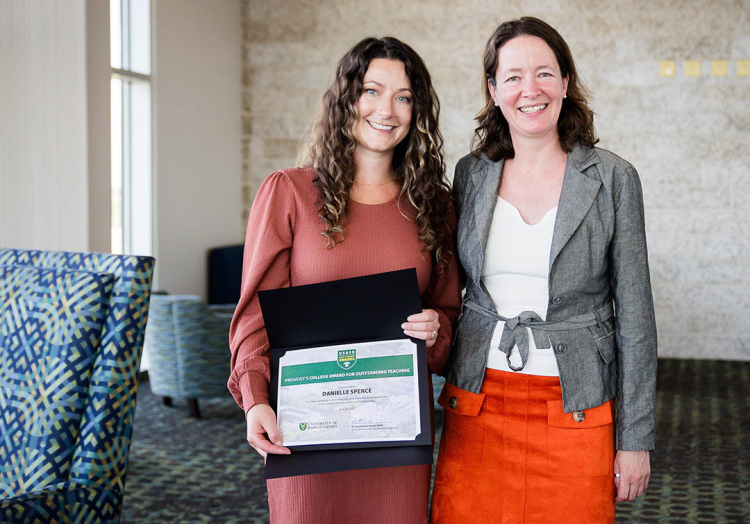For Danielle Spence, a recent graduate student in the University of Saskatchewan's (USask) School of Environment and Sustainability (SENS), water security research isn't just about lab work and analyzing data. It's about listening to the story of what's changing with the climate and what's needed for people and the environment.
Spence's research was grounded in two distinct geographical regions, Buffalo Pound Lake in southern Saskatchewan and Elk/Beaver Lake in British Columbia, and the presence of algal blooms impacting both waterbodies and the communities around them.
While she began with fieldwork and data analysis, she soon drew on her natural ability to see the full picture through conversations with government agencies, water utilities, and community members who rely on the lakes.
"For me, this story was as much about the long-term impact on the environment as it was about the social impact," said Spence, who recently defended her doctoral thesis and will be officially graduating at USask's Fall Convocation. "As a natural scientist, it's important to listen to the messages the environment is sharing through data analysis. But as a human, it was critical for me to work with community members to understand the social impact of the changing climate."

Danielle Spence and co-supervisor Dr. Helen Baulch (PhD) received the 2025 Provost's College Award for Outstanding Teaching. (Photo: Submitted)
That empathetic approach towards people and the planet became the foundation for the next four years of her research.
Spence's dual strength in natural and social science gave her the tools to bridge what many studies leave behind: the technical mechanisms and the human experience. This interdisciplinary approach reflects the core teaching at SENS, a graduate school rooted in interdisciplinary teaching methods and community engagement.
At Buffalo Pound Lake, Spence worked with nearly four decades of data. She used generalized additive models to examine how climate oscillations, water flow management, and nutrients combine to fuel or suppress phytoplankton, which are the microscopic organisms that trigger algal blooms and lead to serious water challenges.
In Elk/Beaver Lake, the suspension of recreational activities due to the presence of potentially harmful algal blooms has become increasingly frequent. Therefore, Spence worked with the community to understand their preferences and willingness to pay to restore the lake, including reducing the frequency of harmful algal blooms.
What makes algae growth especially dangerous is its disruptive effect on ecosystems and the communities that rely on them. From fish kills to drinking water advisories and the suspension of recreational activities, the consequences can be widespread and increasingly hazardous.
For Spence, understanding why algal blooms were becoming more frequent, particularly in these regions, and what role both drought and wet periods played in the degradation of water quality, was vital to identifying recommendations for better outcomes.
"I spent years working with community members, government agencies, and my fellow researchers to analyze data and understand what role each waterbody plays in the regions, and how water quality change had impacted local use and enjoyment of these systems," said Spence. "What I found was that there's a really critical need to work on water quality solutions, not just for drinking water, but also for the many other benefits that waterbodies provide, including recreational activities. People are invested in solutions."
By combining technical models with local voices, Spence made her findings not only meaningful in policy circles, but also relevant at kitchen tables and in community meetings.
Spence's commitment to relationship building extends into teaching. Throughout her PhD, she served as a teaching assistant and award-winning instructor, helping both undergraduate and graduate students navigate complex environmental science concepts.
She earned praise not only for clarifying difficult ideas but also for inspiring students and helping them feel confident while sparking a passion for environmental science and sustainability, leading some students to pursue graduate studies and careers in environmental sciences.
"At the beginning of term, I felt that I lacked so much relevant knowledge," said one former student. "I'd never felt confident working in the field before. But [Spence's] course changed that completely."
This feedback reflects what Spence has made central in the classroom: students are more than learners. They are partners in understanding and, at times, co-creators of change.
This empathetic approach to teaching is also embodied in Spence's thesis, which was driven by a connection to both people and the land with a focus on developing solutions for stakeholders.
"Danielle's work finally answered some key questions about climate and flow management for water quality," said Dr. Helen Baulch (PhD), SENS and Spence's co-supervisor. "Her ability to integrate social and natural sciences makes her a tremendous academic."
Her research offers a roadmap for water management, involving steps that governments, watershed managers, and local stakeholders can take to anticipate and respond to extreme weather conditions including floods and droughts and to restore waterbodies.
In southern Saskatchewan, understanding the impacts of nutrient runoff during flood events and improving flow regulation may help governments align future policy decisions with what communities actually need.
In British Columbia, understanding community preferences and willingness to pay for restoring lakes contributes to more informed, socially relevant, and economically efficient lake restoration.
In early September, Spence defended her thesis and earned her PhD in environment and sustainability, surrounded by colleagues, peers, and family.
"What really struck me as a mark of her character was how full the defence room was when she defended," said Baulch. "As her supervisor, it's really a proud moment to watch someone you've worked with for so long be celebrated by her community, including industry partners, the university community, including SENS faculty and staff, and, perhaps most important, family members who drove hours to fill the seats."
Spence's work is a reminder that science done in isolation is fragile, while science done with and for communities is resilient. Her work shows that the insights derived from models, datasets, and long-term measurement find their full power when matched with empathy, education, and the values of real people.













